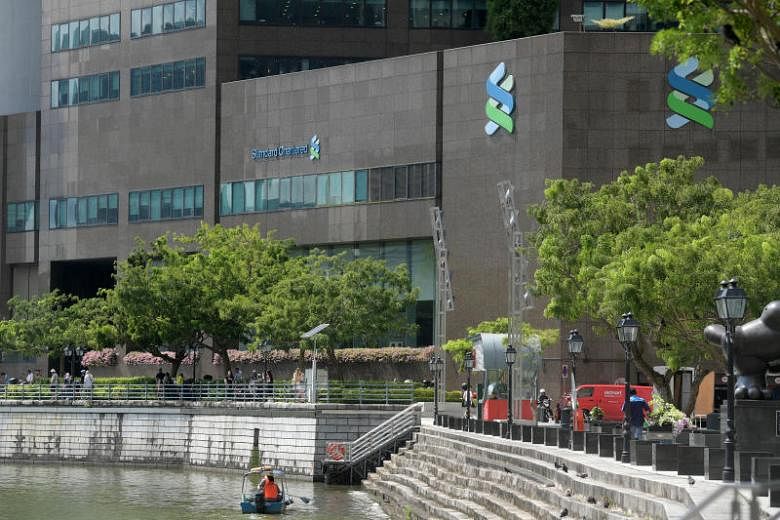LONDON (BLOOMBERG) - Regulators in Europe and Asia are investigating Standard Chartered over the role staff may have played in transferring US$1.4 billion (S$1.9 billion) of private bank client assets from Guernsey to Singapore before new tax transparency rules were introduced, people with knowledge of the probes said.
The Monetary Authority of Singapore (MAS) and Guernsey's Financial Services Commission are investigating the chain of events, said the people. The UK Financial Conduct Authority, Standard Chartered's home regulator, is aware of the transfers, but is not currently reviewing them, one person familiar with the matter said.
The assets - held in its Guernsey trust unit for mainly Indonesian clients, some of whom had links to the military - were moved in late-2015 before the Channel Island adopted the Common Reporting Standard, a global framework for the exchange of tax data, at the start of 2016, the people said. Standard Chartered shuttered its operations on the island last year.
Standard Chartered's processes and the way the transfers were handled are being examined, but regulators haven't suggested that bank employees colluded with clients to evade tax, the people said.
The bank conducted an inquiry and notified regulators after employees raised questions early last year about the timing of the transactions and whether the source of customers' funds had been properly vetted, said the people, who declined to be identified because the details are private.
CEO Bill Winters has dealt with a near-constant stream of misconduct issues old and new in his two-year tenure, from violating US sanctions on Iran to accusations of bribery in Indonesia. The scandals have overshadowed his efforts to turn around the Asia-focused lender. Last year, the CEO introduced a tighter code of conduct, saying senior staff had been flouting ethics rules and saw themselves as "above the law".
The bank remains under the scrutiny of an independent monitor until December 2018 as part of a deferred prosecution agreement with the US in 2012. It has paid almost US$1 billion in settlements for engaging in deals with Iran and for failing to improve anti-money laundering systems. If the lender slips up significantly again, it could face further fines or even the loss of its US banking licence.
A focus of the bank's internal investigation was whether Standard Chartered had adequately scrutinised the source of the customers' funds and performed the appropriate "know your client" due diligence, the people said.
Employees of the trust in Guernsey and relationship bankers in Singapore flagged the US$1.4 billion of asset transfers, when they were first proposed in 2015, noting a sudden flurry of requests in what was previously a static series of accounts, people familiar with the timeline said. The transfers were approved by Standard Chartered's financial crime compliance team after a review, they said.
Guernsey staff highlighted disparities between the earnings of some customers and balances in their accounts: In the most egregious cases, clients had a stated annual income of tens of thousands of dollars yet held tens of millions in their accounts, the people said. Those with links to the military were considered politically exposed persons and should have been subject to a higher level of scrutiny, the people said.
Regulators from Guernsey have travelled to the UK to interview some of those involved in executing and approving the transfers, some of the people said.
The firm's probe also examined if staff breached its code of conduct when making the transfers, and considered if the timing was related to the impending introduction of the CRS tax rules in Guernsey, the people said.
Under the CRS, around 100 countries agreed to automatically share annual reports about accounts belonging to people subject to taxes in each member nation.
The UK, Guernsey, Singapore and Indonesia have all signed the treaty, but adopted the standard on different timelines. Guernsey - a British island in the English Channel and a well-known low-tax, offshore financial centre - adopted the CRS in 2016 and will make its first report this year. Singapore didn't enforce the CRS until the start of this year and will not exchange any tax information until 2018.
Last July, Standard Chartered said it was shutting down its Guernsey office and transferring all its trust and fiduciary services to Singapore, citing "shifting client needs".
Michael Welch, former head of the FBI's international outposts, helped run the bank's internal probe until he departed for the FCA in August 2016, where he is now the director of retail and regulatory investigations. Shaun Mistry, the bank's head of regulatory investigations and special projects, oversaw the lender's review, the people said.
The FCA declined to make Welch available for comment, while Standard Chartered also said Mistry wouldn't comment.
The bank has made numerous attempts to improve its compliance controls, including forming a board-level financial crime risk committee in 2015 and hiring detectives from the FBI, Scotland Yard, Hong Kong police and the New Zealand intelligence agency for its internal investigations team, Bloomberg News reported last year.

